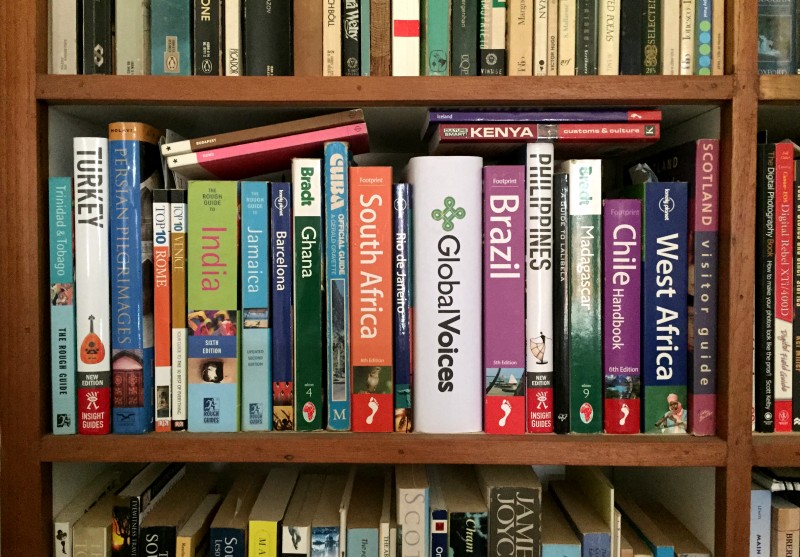
“I prefer bunking down in apartments, hanging with locals, and visiting local hangouts to staying in hotels, package tours, and museum visits. And rather than purchase guidebooks, I like to read the blogs of locals and expats—and Global Voices, of course—to get a sense of a place before I travel.”
A year ago I was in Italy with a friend, lamenting my choice of shoes. I had packed only running shoes and leather boots, and both were soaked to the core after several days of downpours. Our conversation gave birth to an idea: What if there were a website or app that allowed me to “visit” a country at ground level and see what kind of footwear was appropriate? The site would be curated by locals, and would therefore have the side effect of helping me fit in with local fashion, thus minimizing the chance I’d be labeled a tourist.
A silly idea, perhaps, but the impetus behind it isn’t: Many of my generation don’t want to feel or look like tourists when we travel. This explains the rise of companies like Airbnb, that help you avoid tourist hotels and “live like a local.”
Living abroad for a few years at a young age instilled this desire in me as well. I prefer bunking down in apartments, hanging with locals, and visiting local hangouts to staying in hotels, package tours, and museum visits. And rather than purchase guidebooks, I like to read the blogs of locals and expats—and Global Voices, of course—to get a sense of a place before I travel.
This got me thinking: Are there others out there who use Global Voices as a travel guide of sorts? I had the opportunity to put this question to several of my GV colleagues at the recent GV Summit. Here’s what they said:
Marianna Breytman, one of our Spanish-to-English translators, told me:
“I always use GV when traveling because I think it's a really great way to see what issues are currently concerning any given region. Most recently I've done it when I visited Panama, Mexico, and Colombia, and I'm planning to do it again before my trip to Turkey in a few weeks.”
Anna Schetnikova writes for GV in Russian and English. She said:
“I was travelling in Turkey at the time of the recent general elections last summer. And GV was great to use to know about political culture of the country, about different parties and activists and the society, so when I saw posters in the street, I knew what they were about.”
Mohamed ElGohary, GV’s Lingua Translation Coordinator and staff representative on the Board of Directors, recently got married and used GV to research his honeymoon in the Maldives. He said this post factored in his decision-making about which island to visit.
I also posed the question on Twitter: Have you ever used Global Voices to research a place before visiting? Emer Beamer, a social designer and educator based in the Netherlands (and regular GV reader), told me in an e-mail that when she’s looking for “good people” in a certain locale, “Global Voices is a port of call.” When she traveled to Cambodia, she met with three people that she located through GV, and is now working with a GV author on a project.
Beamer told me that she’d love to see GV implement a travel section, and that she would use it to understand “the local work ethic, where to find wifi [and] where the (idea) sharing or counter culture is happening in [a] city.” She said she usually recommends that the researchers she works with check GV before traveling.
Katie Mulloy, who works for UNICEF in Uganda, said that GV is “the logical place to look” for information about a new place, specifically “issues that fly under the radar of the mainstream media.” A seasoned traveler, Mulloy says she’s used the site to research Cambodia, Uganda and Malaysia.
I asked Mulloy to imagine what a Global Voices Travel section might look like. “Most ‘48 hours in X city’ articles are by well-traveled Westerners, for well-traveled Westerners,” she said. “But I’d be keen to know what a South Korean art student would flag as the best things to do in Seoul.”
Ben Valentine is a freelance writer currently living in Cambodia. “As a journalist and as a nerd,” he said, “I want information outside of Lonely Planet [such as] what are the new memes? What are the recent political battles for free speech in these countries? What are bloggers debating now?”
Understanding the perspectives of bloggers and social media users was a recurring theme among the people I spoke to. Moroccan blogger El Mahdi told me that reading GV before traveling gives him “an idea of how people of that country are commenting online in their own words, translated into a language I can understand…” He first used GV to prepare for a trip to Thailand, because he was seeking “things I could read to learn about the country and its culture besides Wikipedia and the clichés we all hear about tourism [there].”
In his e-mail to me, El Mahdi also managed to coin a new term:
“Since [that first trip], GlobalVoicing a country [has become] among the usual things I did before a travel, in addition of course to Googling and Wikipedi-ying the country, especially when I do not speak the country's language.”








4 comments
Travel India ? – YES
Check PNR Status – Here
incredible india.
check pnr status here